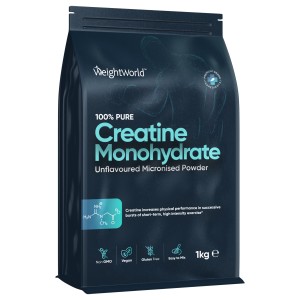All-Natural Supplements
GMP-certified and GMO-Free
Free UK Delivery
Enjoy free shipping on orders above £35
100% Customer Satisfaction
We offer a full 90-day money back guarantee

Fitness and Exercise
What Is BCAA? Discover the Proven Benefits of Branched Chain Amino Acids
10 Min. Read 24 Oct 2024
Difference Between Vitamin D And Vitamin D3
If you're into fitness or muscle-building, chances are you've heard about BCAAs. Branched Chain Amino Acids (BCAAs) are the talk of the gym world, but what exactly are they, and why do so many fitness enthusiasts swear by them? From helping to boost muscle growth to supporting recovery after tough workouts, BCAAs are a crucial part of sports nutrition.
In this piece, we’ll dive into what BCAAs are, explore their proven benefits, and provide practical advice on when to take BCAA and how much BCAA per day is optimal. Let’s get into the details!
What Is BCAA?
BCAAs, or Branched-Chain Amino Acids, consist of three essential amino acids: Leucine, Valine, and Isoleucine. These amino acids are labelled "essential" because our bodies can't produce them on their own. Instead, we must obtain them through diet or supplements.
BCAAs are termed "branched chain" due to their chemical structure, which has a branching side chain. This structure sets them apart from other amino acids, giving them unique properties, especially in terms of supporting muscle metabolism and energy production during exercise.
What Do BCAAs Do?
So, what do BCAAs do exactly? BCAAs play several critical roles in the body, particularly for those involved in intense physical activity. Here’s a closer look:
- Promote Muscle Protein Synthesis: Leucine, the most potent of the three, triggers muscle protein synthesis, which is essential for muscle repair and growth.
- Reduce Muscle Breakdown: BCAAs help reduce the rate at which your muscles break down during exercise, preserving lean muscle mass.
- Boost Workout Performance: By acting as a fuel source for muscles during prolonged workouts, BCAAs may help you push harder and longer, delaying the onset of fatigue.
- Help Recovery: After a tough session at the gym, BCAAs can assist in speeding up recovery by reducing muscle soreness and aiding tissue repair.
These actions make BCAAs particularly appealing to athletes, bodybuilders, and fitness enthusiasts.
What Are BCAAs Used For?
BCAAs are used for various purposes, especially in the fitness world. Here are the primary ways what BCAAs are used for:
- Muscle Growth: BCAAs, particularly Leucine, help activate the pathways responsible for muscle growth. They support muscle mass increase when taken alongside resistance training.
- Workout Recovery: BCAAs are commonly used post-exercise to reduce muscle soreness (also known as DOMS – Delayed Onset Muscle Soreness) and promote faster recovery.
- Preserving Lean Muscle: For those on a calorie-deficit diet aiming to lose weight without sacrificing muscle mass, BCAAs help maintain muscle.
- Improving Endurance: Athletes use BCAAs to delay fatigue and enhance endurance, especially during long-duration exercises like running, cycling, or intense weightlifting.
Proven Benefits of BCAA
Numerous studies have explored the benefits of BCAAs. Below are some proven benefits of BCAAs, backed by scientific research:
1. Enhance Muscle Protein Synthesis
One of the key benefits of BCAAs is their ability to boost muscle protein synthesis. Leucine, a primary component of BCAAs, activates the mTOR pathway, which is essential for muscle growth. A study published in the Journal of Nutrition highlighted that consuming BCAAs post-exercise led to a significant increase in muscle protein synthesis.
This makes BCAAs especially effective for those looking to build muscle mass. If you're thinking, “What is BCAA used for?”, boosting muscle protein synthesis is one of the primary reasons athletes and bodybuilders include it in their regimen. Knowing when to take BCAA can enhance these effects further.
2. Reduce Muscle Soreness
BCAAs can help reduce muscle soreness, particularly after intense exercise. A study in the Journal of Exercise Nutrition & Biochemistry demonstrated that athletes who took BCAAs before a workout experienced significantly less muscle soreness compared to those who didn’t. This effect is particularly useful if you're engaging in high-intensity training.
For those wondering what do BCAAs do, they not only help build muscle but also assist in post-exercise recovery. To reduce soreness, it’s recommended to know when to take BCAA, ideally before and after workouts.
3. Decrease Exercise Fatigue
BCAAs have been shown to lower exercise-induced fatigue, allowing athletes to train harder and for longer. Research in the European Journal of Applied Physiology found that BCAAs reduce tryptophan levels, which delays the onset of fatigue. If you're asking what are BCAAs used for, improving endurance is a notable benefit.
For those wondering when to have BCAA to reduce fatigue, taking them during extended training sessions can help you push through challenging workouts. Understanding how much BCAA per day can further enhance these endurance benefits.
4. Prevent Muscle Breakdown
Another significant benefit of BCAAs is their ability to prevent muscle breakdown. According to a study in the American Journal of Physiology, BCAAs reduce protein degradation, especially during prolonged physical activity. This makes them valuable for individuals looking to preserve lean muscle, particularly during a calorie-deficit diet.
If you're questioning, “What do BCAAs do?”, one key function is to preserve muscle while losing fat. To maximise muscle preservation, it’s important to know when to take BCAA, especially during fasting or extended workouts.
5. Support Weight Loss While Maintaining Muscle
BCAAs not only assist in muscle growth but also help retain muscle during weight loss. A study in the Journal of the International Society of Sports Nutrition found that BCAA supplementation during calorie restriction led to fat loss while maintaining lean muscle mass.
For those looking to lose weight without sacrificing muscle, knowing what BCAAs are used for is critical. Taking BCAAs before or after workouts can support fat loss efforts. When considering how much BCAA per day, 10-15 grams is typically effective for weight loss without muscle loss.
6. Improve Immunity Post-Exercise
BCAAs can even help boost immunity, especially after intense exercise. Research in the Journal of Nutrition found that BCAAs support immune function by enhancing lymphocyte response after exhaustive workouts. This benefit is particularly useful for endurance athletes who often experience temporary immune suppression after long training sessions.
Understanding when to take BCAA to boost immunity is vital; consuming them after intense exercise is recommended. If you're wondering what are BCAAs used for beyond muscle support, their role in immune function makes them a valuable addition to any athlete’s routine.
WeightWorld BCAA With B6 Tablets - 180 Tablets 2000mg
Why Choose Them?
Offering the additional benefits of vitamins B6 and B12, these vegan & gluten-free tablets are perfect for your muscles & energy.
Our satisfied customers love these tablets and have given them an outstanding 4.5 out of 5.
According to Brian S -
“Good products fast delivery easy way to get bcaa into your system just take with water or fruit juice”
Need anything else? At WeightWorld, we offer a wide range of premium fitness supplements and devices for you to choose from. Check them out today!
When to Take BCAA?
Knowing when to take BCAA is key to maximising their benefits. While you can take BCAAs at any time, there are specific windows when they are most effective:
- Before Workouts: Consuming BCAAs before exercise can provide an energy boost and help prevent muscle breakdown.
- During Workouts: BCAAs are useful during prolonged or intense training sessions to prevent fatigue and fuel your muscles.
- After Workouts: Many athletes take BCAAs post-workout to promote recovery, reduce muscle soreness, and enhance muscle protein synthesis.
- On Rest Days: Taking BCAAs on rest days can help with ongoing muscle recovery and prevent muscle breakdown, especially during a calorie-deficit diet.
How Much BCAA Per Day?
The optimal how much BCAA per day depends on factors like body weight, activity level, and specific goals. However, general recommendations suggest:
- For muscle growth and repair: 5-10 grams of BCAA before or after workouts is common.
- For endurance athletes: 10-15 grams throughout the day, especially around workouts, can help maintain performance.
- On rest days: 5-10 grams spread across the day is effective for preserving muscle mass.
Ensure that you adjust these amounts based on your individual goals and activity levels.
Final Say
BCAAs, or Branched Chain Amino Acids, have proven themselves as valuable supplements for muscle growth, workout performance, and recovery. Whether you’re a seasoned athlete or just getting started with fitness, adding BCAAs to your routine can offer multiple benefits. Understanding what BCAAs are used for and knowing when to take BCAAs can make all the difference in achieving your fitness goals.
However, like any supplement, it’s essential to combine BCAAs with a well-rounded diet and consistent training programme to see the best results. Remember, while BCAAs can support muscle growth and recovery, they are not a substitute for hard work and dedication!
FAQs
BCAAs (Branched Chain Amino Acids) are good for supporting muscle recovery after exercise. They’re often used by those involved in fitness routines to help maintain muscle mass and reduce fatigue. If you’re thinking, “What is BCAA good for?”, they’re popular in sports nutrition for promoting endurance and reducing muscle soreness.
If you're curious about “What are BCAAs used for?”, people commonly include them in their workout routines to support muscle growth and recovery. BCAAs are widely used to help reduce muscle breakdown during intense workouts and assist with muscle maintenance, especially after weight training or endurance activities.
You can take BCAAs daily, especially if you follow a consistent workout routine. Knowing when to take BCAA depends on your fitness goals, but many prefer taking them before or after workouts. It’s important to follow the recommended BCAA per day dosage as indicated on the product label.
Wondering what is BCAA best for? It’s often best used for muscle recovery and helping reduce workout fatigue. Many athletes and gym-goers find it beneficial after intense sessions to support muscle repair and reduce soreness after training.
BCAAs are generally considered safe when taken in moderation, but if you have pre-existing kidney conditions, it’s always best to consult with a healthcare professional. If your concern is “What do BCAAs do that might impact your well-being?”, you strictly need to follow the recommended guidelines.
BCAAs are usually well-tolerated, but taking excessive amounts could lead to digestive discomfort or fatigue. Knowing how much BCAA per day is essential to avoid any potential issues. As with any supplement, it’s a good idea to monitor how your body reacts.
While BCAAs can support muscle preservation during weight loss, they’re not directly linked to fat burning. If you’re wondering, “What are BCAAs used for in weight management?”, they’re usually part of a well-balanced fitness plan to reduce fat through exercise and diet while maintaining muscle.
BCAAs and creatine serve different purposes. While BCAAs are known for supporting muscle recovery, creatine helps with strength and power. Deciding whether BCAA is better than creatine depends on your specific fitness goals, as both can complement different aspects of training.
Sources
- https://www.ncbi.nlm.nih.gov/pmc/articles/PMC5568273/
- https://pubmed.ncbi.nlm.nih.gov/20601741/
- https://pubmed.ncbi.nlm.nih.gov/20386134/
- https://pubmed.ncbi.nlm.nih.gov/7810616/
- https://www.ncbi.nlm.nih.gov/pmc/articles/PMC3313152/
- https://www.frontiersin.org/journals/immunology/articles/10.3389/fimmu.2022.886822/full
3000 mg 270 Tablets | 3000 mg 270 Tablets | For Strength, Muscles & Recovery
Powder | Unflavoured Micronised Powder | For High-Intensity Exercise
3000 mg 270 Tablets | 3000 mg 270 Tablets | For Strength, Muscles & Recovery
Powder | Unflavoured Micronised Powder | For High-Intensity Exercise

Next
How Much Ashwagandha Per Day for Testosterone? Find Out Here! What Is Ashwagandha? Testosterone and Its Importance Benefits of Ashwagandha for Testosterone Ashwagandha and Testosterone: What Does Research Say? Is Ashwagandha Safe to Take for Long Periods? Can You Take...
Most Viewed Articles
7 Proven Health Benefits of Apple Cider Vinegar What Is Apple Cider Vinegar? What Are...
On this page What Are the Top Vitamin B12 Foods? What About Vitamin B12 Supplements?...
On this page What Is Moringa? Moringa Leaves vs Moringa Seeds: Which Is Better? 13...












